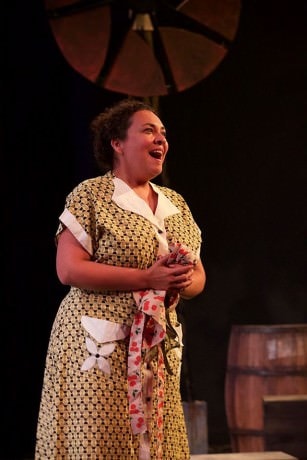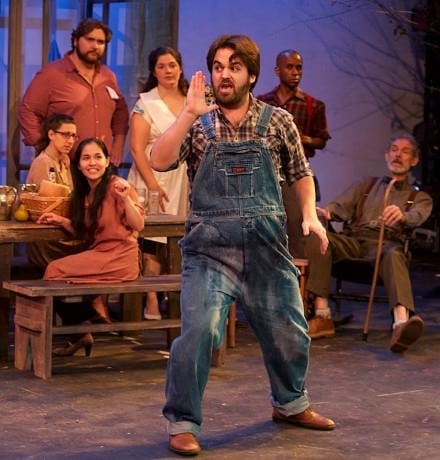How fortunate we are to have The In Series. Over the decades it has taken artistic risks for audiences to extend their knowledge and experiences with a creative artist’s more rarely produced works, or those works that, for whatever reason, have lesser reputations in a particular artist’s total repertoire.
Now The In Series has produced a well-accomplished take on a chamber opera from Aaron Copland’s later years. It is The Tender Land from 1954. Copland and librettist Horace Everett (a pseudonym for Erik Johns, as I understand) centered The Tender Land as a Depression-era rural drama. According to available information The Tender land was inspired by stunning photographs and narrative of that classic book about Depression-era America, Let Us Now Praise Famous Men, by James Agee and Walker Evans.

This is not a review, but an opinion column. This In Series production has been wonderfully reviewed by my DCMetroTheaterArts colleague Jessica Vaughan.
The quick set-up is this: a Midwestern farm girl named Laurie Moss is only one day from her high school graduation. Graduation will gladden the hearts of her unfulfilled, living through her children mother, her lively younger sister and her domineering, over-protective, lover of wine, paternalistic grandfather. Laurie is at the age when she is facing many a life-defining choice; family ties, life on the farm, love and independence.
Laurie has no Brill Building girl-groups to give her guidance in 3-minutes of pop culture written by the likes of Carole King. She has no one her age to talk about what a kiss might truly mean, or what “love” was as her hormones rage. She has no one but a mother to talk to. And she didn’t trust her mother. Such a constrained life for a young woman. At least a similar character, Oklahoma’s Laurey (based upon Lynn Riggs’ book Green Grow the Lilacs) had an Aunt Eller to confide in, or learn from, didn’t she?
For The Tender Land’s Laurie, time is short to make decisions. As she sings, “the world is wide” for a girl who “Once I thought I’d never grow” and feels that “as long as I live here, I’ll never have my own life, no matter what you (mother) promise.” What will happen to someone feeling so ready to grow up, to experience all that life might bring her beyond the wooden gates of her rural Midwestern farm world.
For me, a key to the opera’s dark, stark, blunt force outlook is that it was written by Copland and Everett during the deepest points of the McCarthy Era and House Un-American Activities Committee times in America (think Angels in America). On top of that it began life as an opera for early 1950’s television, no less. The Tender Land’s fictional Laurie is years away from more the seemingly brighter times of independence for some young women depicted in rockabilly classics such as the Everly Brothers “Wake Up, Little Susie” or Buddy Holly’s “Peggy Sue.”
The apprehensive public sentiments of the early 1950’s, with the Cold War deeply ingrained including the Rosenberg Trial and the Army-McCarthy hearings appear mirrored in the worried, nervous world view of The Tender Land. It is a place, far from tender, where an accusation of wrong doing is made against two strangers, that even when soon shown false the damage is done and a community and its inhabitants lives upturned.
In The Tender Land, there is no Joseph Welch asking, “Have you no sense of decency?” Life was not sunny in the ironically titled The Tender Land for those outside the tight mainstream of a community, those who were strangers, or those with a desire for independence from their pre-ordained lives.
The Tender Land, has few truly joyous moments, and one such scene takes wine to loosen people up as well as make them easily suspicious. At the end of Act I, the entire 13-member cast bursts into song and a circle dance to “Thank the Lord for his blessing. O let us be joyful.”

Sadly, this joy is interrupted by the quiet concerned whisper of Ma Moss with some serious accusations about the two strangers, Martin and Top, in their midst. For Ma Moss thinks that Top and Martin are the perpetrators of some unthinkable acts against other young women in the area. Even though they are associated from those specifics crimes, it is too late. Grandpa Moss orders the men away after finding Laurie kissing Martin. (It is not lost on me that we, the audience, know, while the men may not have done what they are accused of, they are not merely wandering innocents in the world).
Laurie and Martin make quick plans to run off together, but Martin and his friend Top later that evening agree that the road is no place for Lauri. She is just too well-raised and will slow them down. They leave. The next morning Laurie wakes, to discover she is alone. She is left to decide for herself what next to do. She determines to leave home, making her own way in the world to find her living and growing. As for Ma Moss, she decides to give all her love to her younger daughter Beth. And this all happens in a blink of the eye as if the running time of Copland’s pocket opera was a key issue.
So with the continuing run-up to the 2016 Presidential election, what will the chamber opera or musical theater of these days come up with about those who are “different,” or “outsiders”? After all, it was only a few days ago that this story about “strangers” appeared in the The Washington Post.
Let me add my kudos and thanks along with DCMTA’s Jessica Vaughan to In Series Artistic Director Carla Hübne and her colleagues. The In Series remains true to its mission: “to create innovative, theatrical programming” and to “embrace fresh approaches to the classics” in its production of the not often produced Aaron Copland’s This Tender Land. A happy day indeed for local audiences.
This Tender Land plays through October 25, 2015 at GALA Hispanic Theatre – 3333 14th Street, NW, in Washington, DC. For tickets, call (202) 234-7174, or purchase them online.
Note: How refreshing to enjoy the voices of unamplified singers where their unaltered voices melded with the music of the instrumental ensemble under the baton of Stanley Thurston and the staging of Director Stephen Scott Mazzola.





